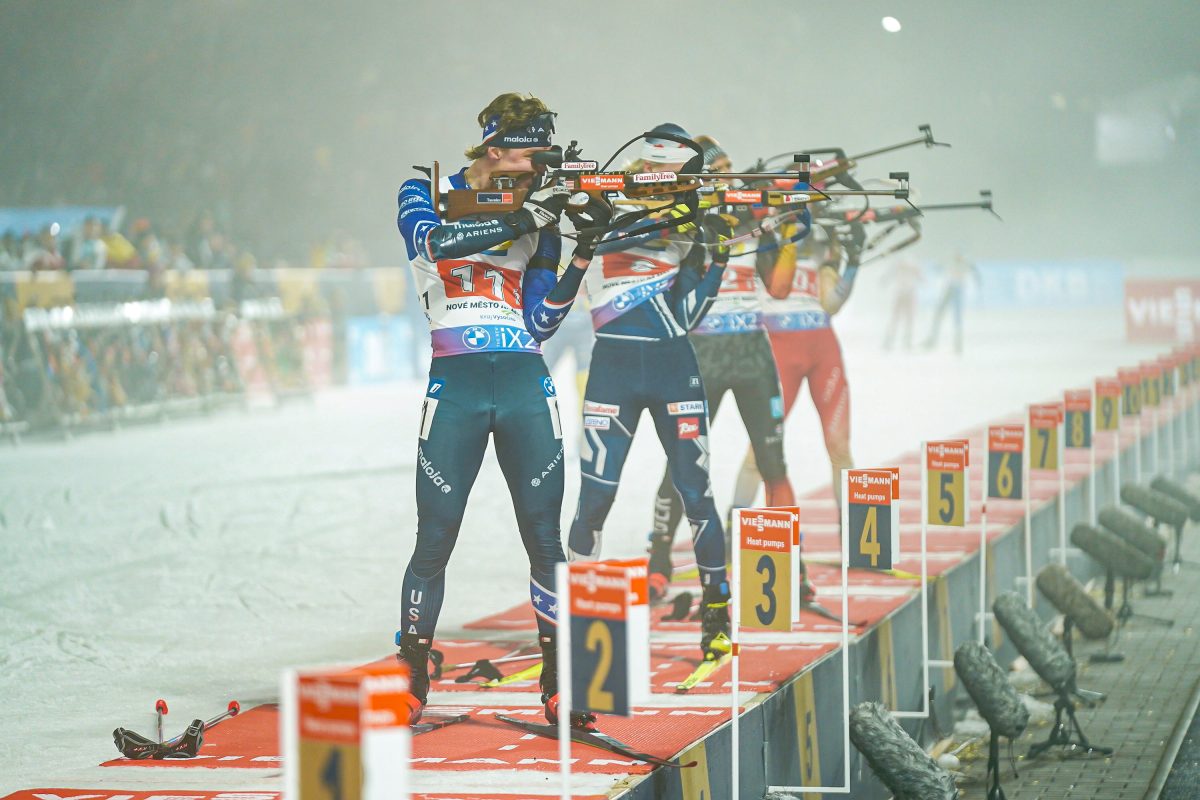Two biathletes won gold medals in biathlon today, each of them with an inspiring performance.
But sadly, the focus on Tuesday wasn’t the skiing—it was a pair of serious errors committed by organizers in the men’s and women’s pursuit that potentially altered outcomes of both races.
In the women’s event, three athletes were sent out late, resulting in the replacement of the race referee, according to Norbert Baier, the International Biathlon Union (IBU) official responsible for overseeing today’s starts. But it didn’t help: in the men’s edition, Canada’s Jean-Philippe Leguellec and the U.S.’s Jeremy Teela jumped the gun as well.
None of the athletes affected skied fast enough to win a medal, even after results were corrected. But Sweden’s Anna Olofsson-Zidek was just eleven seconds from bronze after her time was adjusted, while Leguellec was skiing as high as second place during his race, before missing some key shots.
There’s no telling exactly how things would have played out without the errors. But start times make a big difference in a pursuit, when athletes are skiing against each other in their real positions—as opposed to an individual race, when they’re going against the clock.
“In a head-to-head race, that’s not right. They should have stopped the race, in my opinion, and re-started,” said Per Nilsson, the U.S. head coach. “This should not happen at the Olympic Games, for sure.”
Afterwards, surrounded by a dozen reporters, Baier tried to describe what went wrong.
In the women’s race, the athlete ahead of Olofsson-Zidek, Darya Domracheva (BLR), tried to leave her gate early before being pushed back by the official in her lane. The tussle was registered as an extra start by the timing equipment, which led to the errors with Olofsson-Zidek and the two athletes behind her before organizers noticed a problem.
Baier said that the IBU switched race referees between the women’s and men’s races in an effort to make the start go more smoothly. But somehow, Leguellec and Teela ended up in each other’s lanes (there are three for a pursuit start), and each started thirty seconds too early.
While the problems went mostly overlooked in the morning’s race, coaches in the range noticed something was wrong as soon as Teela and Leguellec went out too early. The Swedes shouted at the organizers to stop the race, while others hurriedly engaged Baier in a dicussion.
By the time the men were on the second of five laps, the American and Canadian coaches had been notified of the mishap and a resulting thirty-second time addition for each athlete. Nilsson said that he in turn let Teela know while he was still on course.
Learning of the penalty changed the dynamic of the competition for him, Teela said.
“When you hear that you’re going to get a time addition, I don’t know, it ruins—by then it’s a different strategy,” he said. “I was making a lot of risks [earlier in the race] when I was with Ole Einer [Bjoerndalen]…if I had known I was going against the clock, I would have played it a little bit different.”
Leguellec said that he was aware of the mistake as soon as he stepped out on course, but he took a more sanguine view. He was clearly given a boost by the head start, as it allowed him to ski with the leaders and feed off the energy from an unaware and ecstatic home crowd.
“It was a good race,” Leguellec said. “I had a really aggressive first prone shooting and came up in second, obviously because I came out a bit too soon off the start gate, but whatever. It was still pretty fun to be in that pack.”
His next remark cut to the heart of the problem.
“I wasn’t feeling all too peppy in the ski,” Leguellec said, “but I was always around fast people that kept me in the game.”
Mishaps like this one have happened before—Nilsson mentioned a similar incident that occurred at a World Cup in Russia.
But at the Olympics, where the stakes are so high, there’s more pressure on officials to get it right—especially after some wild snow conditions skewed the results from the first men’s race on Sunday.
Baier himself acknowledged that there were warning signs, like when last night he was informed by the local organizer that the volunteers in charge of the start were inexperienced.
But today, he said that the men’s race shouldn’t have presented a challenge, since the gaps between starters were relatively large, making things easier to organize.
“I can’t understand why this could happen—it was so easy to start today,” Baier said. “It was really a very bad day for us.”
For the athletes, though, who have prepared for these Games for four years, the damage was done. Teela wasn’t cutting organizers a whole lot of slack.
“I have a job to do,” he said, “but they have a job to do, too.”
—Topher Sabot contributed reporting
Nathaniel Herz
Nat Herz is an Alaska-based journalist who moonlights for FasterSkier as an occasional reporter and podcast host. He was FasterSkier's full-time reporter in 2010 and 2011.



